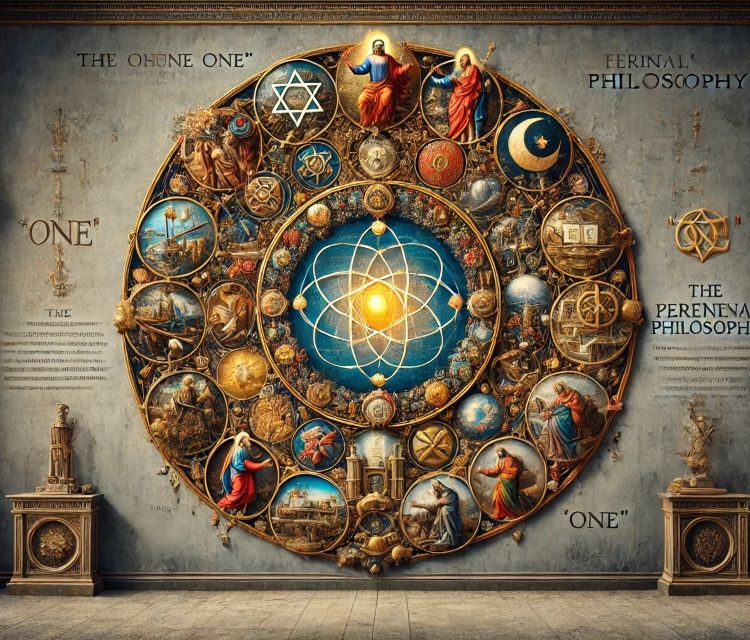Unveiling Universal Truths: A Journey Through Perennial Philosophy
In our world, a vibrant tapestry of religious traditions unfolds, each with its distinct rituals, beliefs, and deities. Yet, amidst this diversity, a profound question arises: is there a unifying thread woven through these seemingly disparate faiths? This is where the captivating concept of Perennial Philosophy steps in, offering a lens to explore the potential for shared truths across religions.
Perennial Philosophy proposes the existence of universal truths, a core essence that resonates beneath the surface of all major religions. Imagine these truths as hidden rivers, flowing beneath the diverse landscapes of religious practices and doctrines. Proponents argue that these core principles shape the beliefs and rituals of various faiths, much like different languages utilize unique grammar and vocabulary to convey fundamental human ideas. Perennial Philosophy suggests that religions offer distinct “languages” to express the same fundamental truths about our universe, our place within it, and the connection we share with a higher power.
Unveiling the Divine Spark:
Perennialists believe that each religion provides a path towards uncovering the divine reality, a force that transcends the physical world. This reality can be accessed through mystical experiences, moments of profound connection with something far greater than ourselves. These experiences might manifest variously across traditions – from the ecstatic union with God described by Christian mystics to the Buddhist state of Nirvana or the Hindu concept of Moksha. Regardless of their specific form, these experiences point towards a unifying truth.
1-Minute Prayer for Abundance: Hear the Divine Words That Manifested Miracles (Click Here)
Echoes from the Past:
The concept of Perennial Philosophy finds its roots in the Renaissance, a period where scholars rediscovered and embraced Neo-Platonism. This philosophical school emphasized the “One,” a singular source from which all existence originates. Perennial Philosophy builds upon this idea, suggesting that ultimately, all religions strive for a return to this “One,” the divine reality.
A Champion for Unity:
Aldous Huxley, a renowned writer, became a prominent figure associated with Perennial Philosophy. In his acclaimed book, The Perennial Philosophy, Huxley compared the teachings of saints and mystics from diverse faiths, highlighting the common themes and experiences they shared. He argued that the surface-level differences in rituals and doctrines were less significant than the underlying truths they all pointed towards.
1-Minute Prayer for Abundance: Hear the Divine Words That Manifested Miracles (Click Here)
Beyond Criticism:
While Perennial Philosophy offers a compelling framework for understanding religion, it does not stand without its critics. Some argue that it oversimplifies the rich tapestry of religious traditions, neglecting the unique cultural and historical contexts that shape each faith. Additionally, the emphasis on mystical experiences might be perceived as elitist, excluding those who haven’t had such encounters.
Embracing the Journey:
Despite these criticisms, Perennial Philosophy remains a valuable lens for exploring different faiths. It invites us to look beyond outward differences and focus on the potential for universal truths to connect us all. Perhaps by understanding these common threads, we can build bridges of understanding and foster greater empathy across religious divides. As we embark on this journey of exploration, remember that the divine spark may not always manifest in spectacular ways. It might reside in the quiet moments of contemplation, the acts of kindness towards others, or the simple awe inspired by the beauty of the natural world.
1-Minute Prayer for Abundance: Hear the Divine Words That Manifested Miracles (Click Here)
Frequently Asked Questions (FAQs):
Is Perennial Philosophy saying all religions are the same?
No. Perennial Philosophy suggests that all religions share core truths but acknowledges their unique expressions through rituals, doctrines, and historical contexts.
Does Perennial Philosophy dismiss the importance of specific religious practices?
Perennial Philosophy does not negate the significance of practices within each faith. However, it suggests that these practices serve as pathways to the same underlying truths.
How can I learn more about Perennial Philosophy?
You can explore the works of Aldous Huxley, Huston Smith, or Frithjof Schuon. Additionally, consider engaging with interfaith dialogues or online communities that explore the connections between different religious traditions.
